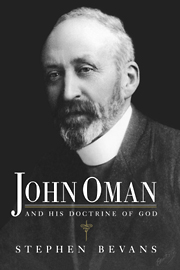Summary
“Who is John Oman?” This question has been put to me hundreds of times by relatives, friends, people at dinner parties – anyone who has inquired about my academic interests over the past several years. Oman's name is certainly not a “household word” among students of theology today, and he goes largely unread despite the fact that his works have occasionally been reprinted. Even among members of his own tradition, the United Reformed Church in England and the various branches of Presbyterianism in Scotland, Oman's work remains a relatively forgotten part of the British theological heritage.
This book, however, is founded on the conviction that John Oman should be read today, and that he can be read with much profit. His language might border on the old-fashioned and the Victorian, but there is a persuasiveness and depth to his thought that greatly repays any effort to understand and appreciate it. Oman is neither a contemporary theologian, nor a well-known one, but I believe that a study of his writings can shed fresh light on many of the theological questions that we struggle with today, especially on the question that is the foundation and goal of all theology: the question of God.
Oman's never-wavering conviction was that the only God who is worthy of the name is a God whose passion is men and women, all of whom God invites by every circumstance of their lives into a gracious, personal relationship with Godself and life-giving communion with one another. He never wrote a book on God as such, but all his thought was based on this conception of God's radically personal nature and gracious dealing with humanity.
- Type
- Chapter
- Information
- John Oman and his Doctrine of God , pp. 1 - 3Publisher: Cambridge University PressPrint publication year: 1992



